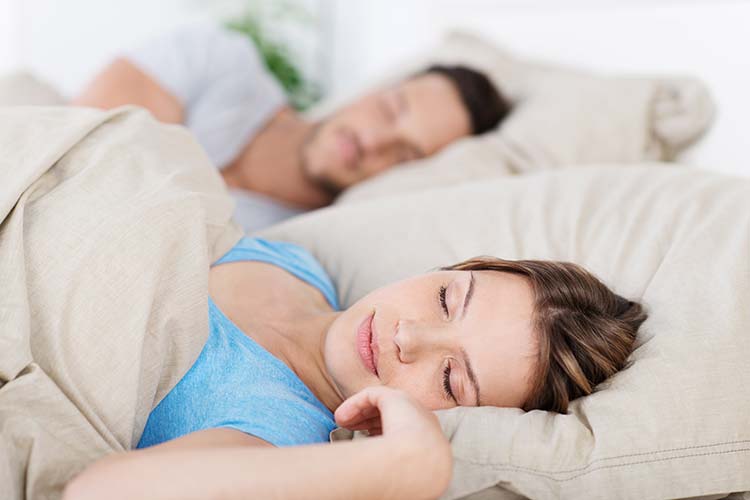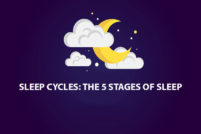The consequences of chronic lack of sleep are well documented; and while you may think you’re getting enough, do your sleep habits match-up with medical recommendations?
What about your children?
Or your pets?
Sleep is not just important; it’s necessary for our bodies to function properly. Every aspect of our health — both physical and mental — is impacted by the quality of our sleep.
Knowing the sleep requirements for every age enables you to take proactive steps to improving your overall well-being.

Infants And Toddlers
Newborns

During the first four weeks of life, babies require 14-17 hours of sleep per day. However — as any new parent is painfully aware of — at this stage it all takes place during short cycles of just a few minutes to 2-4 hours. [1]
Newborns’ sleep cycles are not yet regulated by circadian rhythms — our internal body clock guided by daily cycles of light and dark.
For this reason, there is no seeming pattern to your baby’s sleep at this age: This is entirely normal and healthy as long as baby is sleeping the recommended hours over the course of the day. [2]
Babies (1 Month – 12 Months)

After that first month, your baby’s sleep requirements will reduce slightly to 12-15 hours per day. Thankfully, the duration of sleeping periods will increase to 4-6 hours, and you may begin to notice a more definite pattern in your baby’s sleep as they start to sync with a day-night schedule.
Your baby will likely need to nap 3 times a day, for 1-2 hours depending on how much time they spend asleep during the night. At 6 months, your baby may be sleeping through the night and the time spent napping will adjust accordingly. [3]
Toddlers (1-3 Years)

After the first year, your baby needs 11-14 hours of sleep per day but will likely be getting the most of this during the night. Consequently, by 18-21 months of age, they’ll only require on nap to make up the difference. [4]
Young Children
Preschool (3-5 Years)

Once your child reaches preschool age napping will begin to taper off, but they still require 10-13 hours of sleep per day.
Many children this age tend to be early risers, so it’s important to get them to bed at a decent time to enable them to get the correct amount of sleep.
School Age (6-13 Years)

The majority of kids stop napping altogether by the age of 5, and with increased demands on their time due to school and extracurricular activities it’s crucial that they get the recommended 9-11 hours of sleep per day.
Teenagers (14-17 Years)

While teenagers are notorious for being night owls, they still need 8-10 hours of sleep per night. Nearly two-thirds of high school students are sleep deprived, which can impact their performance at school, their mood, and even lead to depression. [5]
It’s important to continue to enforce a consistent sleep-wake routine: Talk to your teens about the importance of sleep and sleep hygiene.
Adults (18-64 Years)

Adults need 7-9 hours of sleep to be properly rested. Unfortunately, sleep deprivation in this population is so prevalent that the CDC recognizes it as a public health problem. [6]
Between juggling a myriad of responsibilities, rising stress levels and the impact of shift-work on circadian rhythms, adults are simply not getting enough sleep. It’s just as important now as it was when you were a kid to have a consistent sleep schedule.
Seniors (64+ Years)

The amount of sleep you need once you reach your golden years decreases slightly to 7-8 hours. [7]
However, many seniors experience sleep disturbances that significantly impact the quality of their sleep and reduce the actual number of hours spent in restful sleep throughout the night.
For this reason, you may find it necessary to include a nap in your daily schedule to get the right amount of sleep.
Pets

Something we often don’t consider when it comes to our furry companions is how much sleep they need. It’s just as important to allow your pets to get the rest they need to function properly and maintain their health.
Dogs
When you first bring that puppy home, he or she will need to sleep about 17-20 hours per day. As your dog gets older, they will expend less energy and require 12-14 hours of sleep.
However, much of this time is accrued through dozing or very brief naps throughout the day. On average, your dog will spend 50% of the day sleeping. [8]
Cats
Felines are known for their sleepy lifestyles: In fact, cats need anywhere from 15-20 hours of sleep per day. Kittens and older cats will sleep more than an adult-aged cat. [9]
On top of this, cats are most active during the nighttime — which may come as a surprise to new cat owners who are startled awake by their kittens late night antics.
During the day, you’ll observe the infamous “cat-nap”: these last about 15-30 minutes and your cat can be woken up by the slightest disturbance, ready to pounce.
Conditions That Influence The Amount Of Sleep You Need
While age is a major determinant of the amount of sleep your body needs, other factors may occur throughout your lifetime which influence sleep requirements:
Colds & The Flu
Not only will getting a good night’s rest when sick get you back on your feet quicker, but good sleep habits have been proven to decrease your susceptibility to the common cold and flu viruses in the first place. [10]
Your immune system requires sleep to function at peak capacity: which is important but especially so when our bodies are trying to fight off an infection.
Additionally, studies have shown that while we sleep our fever response is augmented, which best enables our immune system to get the job done.
Pregnancy
During pregnancy, the National Sleep Foundation recommends that you tack on a few additional hours of sleep each day; either by going to bed a bit earlier or catching up with a nap during the day. [11]
Fatigue is most prominent in the first trimester when rising levels of the hormone progesterone lead to an increase daytime sleepiness.
Expecting mothers also tend to experience more sleep disruptions due to general discomfort and more frequent trips to the bathroom. [18]
Sleep Disorders
Many sleep disorders will affect the amount of time you need to sleep due to their effect on the quality of sleep you receive.
Conditions such as sleep apnea and restless-leg syndrome cause frequent nighttime awakenings, which ultimately lead to you being less-rested overall.
Other sleep disorders affect the quality of your sleep, often reducing the time spent in REM. If you suffer from any of these conditions, it’s recommended that you plan for an early bedtime to get the most rest possible out of your night.
The Consequences Of Sleeping Too Much
While the majority of us could benefit from a few extra hours of shut-eye each night, that’s not to say that “the more sleep, the better.” Oversleeping has its own negative impacts on health and well-being.
Chronically oversleeping increases your risk for: [12]
- Heart Disease
- Diabetes
- Obesity
- Back Pain
- Headaches
- Depression
If you are concerned you may be sleeping too much, check with your doctor to verify if there is an underlying medical condition (such as hypersomnia) or if it may be a side-effect of a medication. You and your doctor can then decide the best way to proceed.
Get Proactive About Your Sleep
There are countless benefits to getting the right amount of sleep: From reduced risk of multiple medical conditions to improved mood and cognitive functioning.
So get on your mattress and make sleep a priority in your life and experience the impact for yourself. If you are looking for a new mattress, check out our top recommendations, comparisons and in-depth reviews.
If you’re having trouble getting a good night’s rest that are many tips and tricks to help you sleep better. By developing the right habits and bedtime rituals, you can fall asleep faster and sleep deeper.





